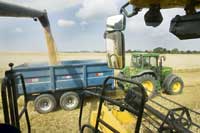Crisis: 6000 new entrants needed every year

A critical shortage of farmers and skilled farm workers is threatening Britain’s ability to produce enough food.
An ageing workforce means the agricultural industry will require 60,000 new employees over the next decade. Yet job vacancies are proving increasingly hard to fill because the sector is frequently perceived as unattractive.
Challenges such as food security and climate change are adding to the crisis, with farmers and farm workers needing to acquire even higher levels of management skills and knowledge to do their job.
The situation is highlighted in a report by Lantra, the sector skills council for the UK’s environmental and land-based industries. Findings from the study were presented to MPs on 21 October.
Some 41% of people working in agriculture are 50 years or older, says the report. The average farmer is 55 years old and about half do not have a successor, with the younger generation often opting for a career outside the industry.
Peter Martin, Lantra’s chief executive, said: “This major piece of research gives us all food for thought. We must address these critical shortages in the workforce now and take on board the need for ever increasing levels of skills.
“This is also a modern and technical sector and if we are to meet the challenges climate change and food security throw at our farmers and growers, we must act now to address these skills issues.”
Some 31% of vacancies across agriculture are hard to fill because of skills shortages, compared to 21% across all other employment sectors, warns the document, with significant problems for farm managers (70%) and farmers (59%).
Agriculture must be recognised as a strategic priority by Westminster if farmers were to deliver the increase in productivity necessary in future years, said Mr Martin.
He added: “There are thousands of businesses out there prepared to play their part but their vital role in feeding the nation has to be recognised and supported at the highest level.”
A DEFRA spokesman said improving skills was a core element of the government’s vision for farming. Funding for training and skills development was available under the government’s rural development programmes.
